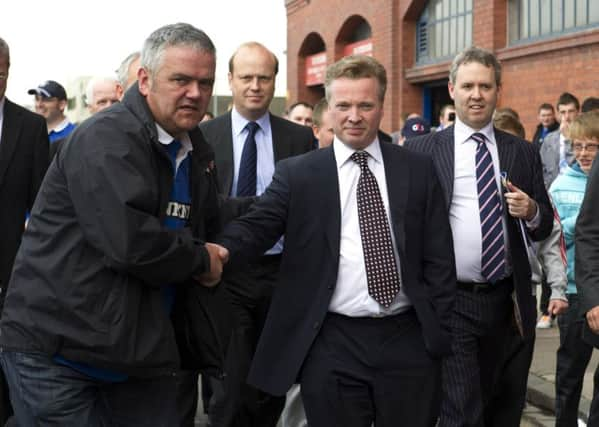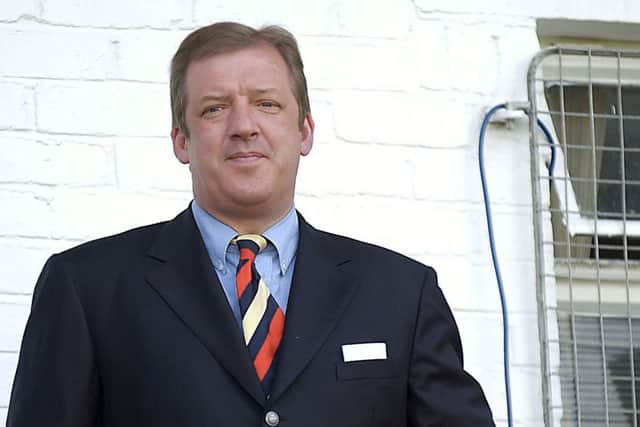The Old Firm Story: How Rangers imploded financially


Top-flight football will return to Ibrox for the first time in four years tomorrow when Rangers host Hamilton. But the extent to which the club can be considered the same as the one which was liquidated in 2012 remains a source of fierce debate.
Some contend it is a new club and the term Old Firm is obsolete. Yet, the current version of Rangers – and the name of the team never changed legally – is spiritually connected with the 1872 club, and so builds upon that original club’s history.
Advertisement
Hide AdAdvertisement
Hide AdThe financial implosion which caused Rangers to start again in the fourth tier in 2012 led to an unprecedented level of bitterness and acrimony, even for a Scottish game marinated in such poisons. The schisms about old and new Rangers were then fuelled by the authorities’ desperate attempts to protect one of their cash cows by attempting to allow Rangers to regroup in the First Division after the top-flight clubs voted overwhelmingly against allowing them straight back into the Premier League.


Only an uprising en masse among supporters of other teams, who threatened to withdraw the financial lifelines that their custom provided to their own clubs, prevented that.
To understand the antipathy towards Rangers then is to recognise what caused the Ibrox club’s 2012 demise. The blame for ruining Rangers is often laid at the door of Craig Whyte, whose purchase of David Murray’s shareholding – for £1 – the previous year set in motion a train of events that led to Rangers calling in the administrators, Duff and Phelps, in February that year.
Whyte is currently facing fraud charges for his dealings at Rangers. The non-payment of PAYE and VAT during his short reign brought about administration – and the docking of ten points midway through the 2011-12 season. It ended with a £5.5m asset sale to Charles Green before creditors – chief among them HMRC – voted against a Company Voluntary Arrangement. By doing so they condemned The Rangers Football Club Plc to liquidation, with Green transferring the assets to a company that took the name of Sevco.
But Rangers’ demise has its roots in David Murray’s stewardship. The entrepreneur enjoyed an eye-watering credit facility with the Bank of Scotland. It allowed Rangers to operate with frightening debt levels; racked up in part to keep ahead of a Celtic revitalised by Fergus McCann and in part to make a European breakthrough under then manager Dick Advocaat.


Yet, even the bank’s generosity had its limits. Their desire for Murray to show some fiscal responsibility in running his football club caused him to seek other ways of inflating Rangers’ pulling power for players. Initially, he sought the ‘tax efficiency’ of a Discounted Share Option scheme to attract world-renowned players such as Ronald de Boer. The DSO scheme did not stand up to scrutiny, and by the end of the decade the club were facing a bill of around £4m for what later became known as the ‘wee tax case’.
However, in seeking to redefine their tax efficiencies after the ill-fitting DSO scheme and gain more bang for their buck by limiting players’ exposure to income tax and national insurance, Murray marched Rangers into a minefield blindfolded. The use of Employee Benefit Trusts proved ruinous to the club. These EBTs were set up to take the appearance of discretionary loans that made them therefore not subject to tax. After the bank turned off Murray’s credit tap, there was a flood of EBTs as a payment method for players and management at the Ibrox club. Right through the financial crash of 2008, when Celtic were proving expensive to keep up with as champions.
HMRC sought to address the EBT loophole and billed Rangers for £40m, the sum they calculated – with interest – was owed to the Revenue. They did so after finding the club uncooperative in providing paperwork that might have related to this, side-letters they were sure existed but that Rangers denied knowledge of. Side-letters that players required to ensure they had written financial obligations from the club for nominal loans.
Advertisement
Hide AdAdvertisement
Hide AdThe crux of all the grief subsequently visited upon Rangers lies in the use, and administering, of these EBTs. A first tier tribunal in 2012 found in Rangers’ favour and adjudged that the sums placed in the trusts were not subject to tax. Two years later an upper tribunal largely upheld the decision. But HMRC appealed successfully to the Court of Session last year where three judges said it was “common sense” to see the monies placed in the trusts as salary payments. Currently the case is before the Supreme Court for a final ruling. If the Supreme Court decides that EBTs contravened tax law, then the ramifications could be profound. Not for the current Rangers in a financial sense – the incorporated company of the current Ibrox club has no liabilities for anything before its 2012 creation – but in a football sense.
The side-letters created for dozens of players to service the EBT scheme were not lodged with the football authorities. A commission into this improper registering of players in 2013 found that Rangers had “deliberately” failed to register side-letter holding players with the SFA. Chair of the commission Lord Nimmo Smith posited at that time that no sporting advantage had been gained by the club, and therefore there wasn’t a question of a sporting sanction. Should the Court of Session’s decision be backed by the Supreme Court then there will likely be a clamour for sporting sanctions to be imposed.
That could yet be another bitter aspect of Murray’s legacy, with the pursuit of Rangers by HMRC having made it unsellable before “turnaround specialist” Whyte entered the scene... supposedly as a billionaire with wealth off the radar.
It almost seems a postscript to consider what was happening to Celtic as Rangers restarted in the fourth tier in 2012. The Parkhead club did as their financial muscle guaranteed they would do, and that was rack up titles. They are now halfway towards their pursuit of a record ten in a row.
